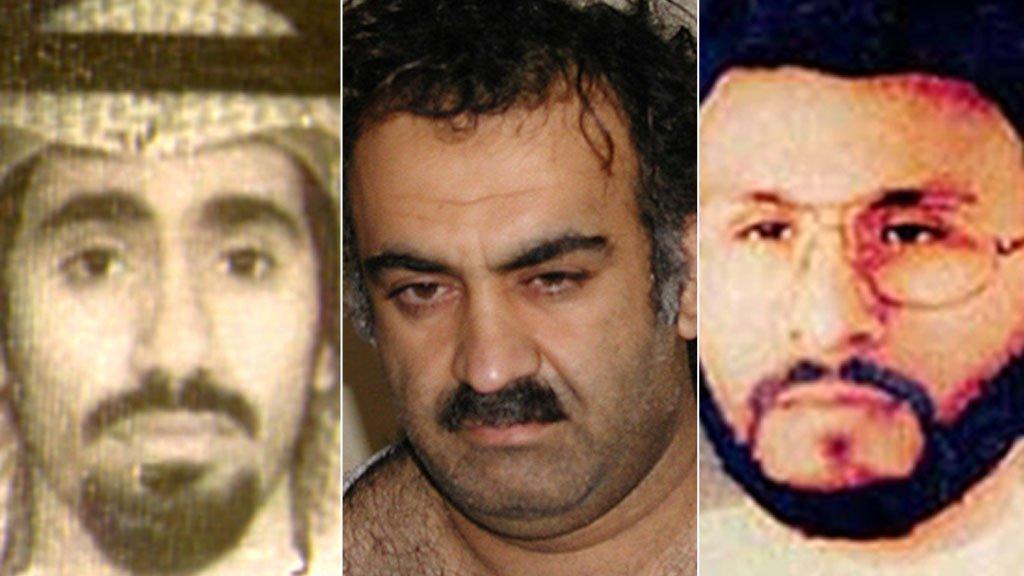Abu Zubaydah: Top US court to rule on test case over state secrecy
- Published
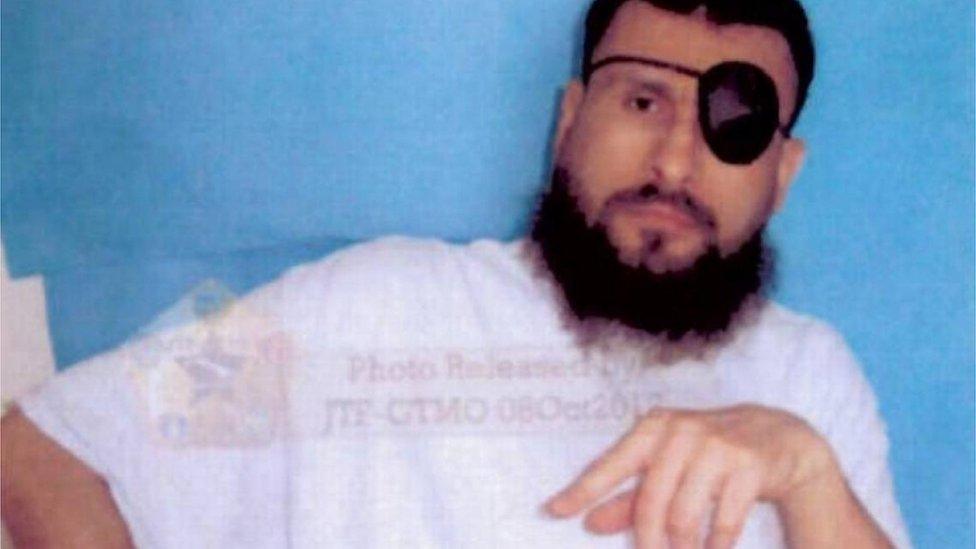
Abu Zubaydah has been held at Guantanamo Bay without charge for over a decade
An ex-CIA officer turned whistleblower against torture has called for the release of a suspected terrorist he captured nearly 20 years ago.
John Kiriakou told the BBC that the torture and imprisonment of al-Qaeda suspect Abu Zubaydah has been "more than adequate punishment".
The call for Mr Zubaydah's release from US custody came as the Supreme Court heard arguments on Wednesday weighing the US government's ability to keep potential torture evidence secret.
Mr Zubaydah's detention lies at the heart of the case before the high court.
Following his 2002 capture in Pakistan, the Palestinian has claimed that he was waterboarded, beaten, deprived of sleep, isolated and kept in painful "stress positions" during interrogations at a secret CIA "black site" in Poland before being transferred to detention at Guantanamo Bay, where he has been held without charge since 2006.
The black sites were a network of facilities around the world used by the CIA to house and interrogate terror suspects in the years following the 11 September 2001 attacks.
Mr Zubaydah has attempted to subpoena two CIA contractors for a Polish criminal investigation into the black site.
The US federal government, however, has blocked the subpoenas, arguing that releasing the information would harm national security.
The case is the first involving a Guantanamo Bay detainee heard by the Supreme Court in more than a decade. A ruling will have wide implications for determining the limits of the US government's right to secrecy.
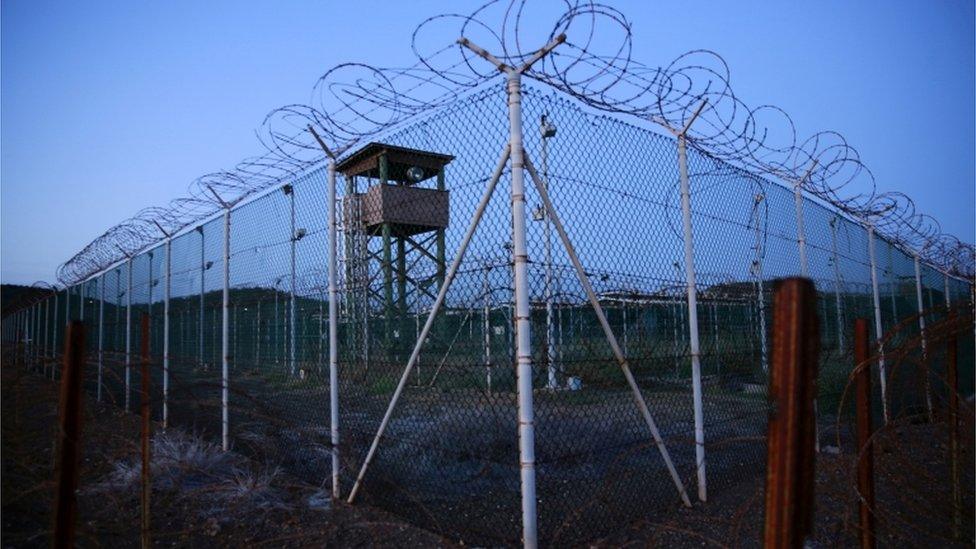
Camp Delta at Guantanamo Bay
After being captured in Pakistan in March 2002, Mr Zubaydah - whom the George W Bush administration believed was a high-level terrorist recruiter and planner - was taken to black sites in several countries, including Thailand and Poland.
While in CIA custody, he was questioned under torture.
A US Senate report later found that Mr Zubaydah's interrogations included 83 instances of waterboarding, as well as sleep deprivation and 11 days confinement in a coffin-like box. While in CIA custody, Mr Zubaydah also lost his left eye.
"I think that whatever it is Abu Zubaydah did, he's certainly paid a very heavy price," said Mr Kiriakou, who in 2007 blew the whistle on CIA torture and was later imprisoned for leaking the name of a covert operative involved in the interrogations to a reporter.
The Supreme Court case stems from a Polish investigation into whether Polish officials were complicit in the CIA's programme.
At the request of Polish investigators, in 2017 Mr Zubaydah's legal team sought testimony from CIA contractors James Mitchell and Bruce Jessen. Both men were psychologists who played a key role in the agency's 'enhanced interrogation' programme.
A federal district court voided the subpoenas over risk that government secrets would be revealed in court. The ruling was based on a legal doctrine called the "state secrets privilege", which allows the government to withhold information in courts if it claims that disclosure could endanger national security.
A higher court in California sided with Mr Zubaydah, however, saying that such blanket denials went too far.
The Supreme Court case looks at how much discretion judges should give the US government when making national security judgments.

Abu Zubaydah spent time at a "black site" in Poland. At some point during his multi-decade detention, he was tortured. All this is public knowledge. What the United States government has not done is officially acknowledged a link between the two.
During the Supreme Court's oral arguments in the case on Wednesday, the nine justices pressed Brian Fletcher, the US government's lawyer, on why this "public knowledge" should still be treated like a secret. The answer, he said, was that the US had given its word to Poland to keep the information confidential.If it had been a domestic US case the calculus might be different, he said, but this involved a diplomatic agreement - and it was in US national security interests to honour its promises.
Justice Elena Kagan was sceptical, calling it "a little bit farcical" to use a state secrets privilege to protect something that is no longer one.
Several justices expressed frustration that the US government has been limiting Mr Zubaydah's ability to testify on his own behalf. His account would be a much more direct way of establishing the link between Poland and torture. It was asked why, almost two decades after his capture and following the end of US military involvement in Afghanistan, was he still being held by the US at all? But that, Mr Fletcher said, was a matter for another court hearing on another day.

In early 2020, both CIA contractors involved in Mr Zubaydah's case testified in a military tribunal in Guantanamo Bay regarding their interrogation of suspected September 11 plotters, and both were later deposed in a separate lawsuit brought by the American Civil Liberties Union.
"There's a tonne of information out there in the world about what these two guys did," said Charles Church, a long-time member of Mr Zubaydah's legal team, but who did not represent him at the Supreme Court. "There's very little chance - or virtually no chance - that our nation's security is going to be put at risk," he argued.
Mr Kiriakou said that for years the intelligence community "has relied on state secrets to get out of situations they find uncomfortable".
"This is one of those situations."
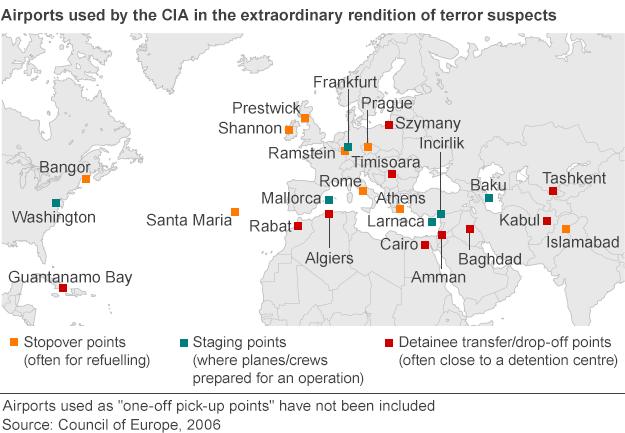
To date, the CIA has never acknowledged that it ran a black site in Poland. In 2015, the European Court on Human Rights, however, found that Mr Zubaydah was held there and that it is "inconceivable" he was not tortured while at the facility.
US officials initially alleged that Mr Zubaydah - whose given name is Zayn al-Abidin Muhammad Husayn - was a high-ranking member of al-Qaeda and served as a senior lieutenant to Osama Bin Laden.
The Senate torture report later found that the CIA had "significantly overstated" Mr Zubayah's role in the organisation but that he was a member. The CIA's assumption about Mr Zubaydah's power within al-Qaeda "simply wasn't true", Mr Kiriakou said.
He was merely "a troubled young man" who "threw in his lot with the wrong people and was in over his head", according to the ex-agent.
A secret diary belonging to Mr Zubaydah was released in 2013, after it was obtained by Al Jazeera. A portrait of Mr Zubaydah emerged in the pages of his journal that was more complex than the one that US officials had painted.
He wrote most often when he was feeling upset, or lost. After a friend was killed, in the autumn of 1991, he turned to the journal for solace: "I opened my bag which was covered with dust," he wrote. "I got this notebook out of it and I held the pen and started writing."
He enjoyed Irish music and poetry and experienced homesickness, the entries revealed. "My only friend is the cigarette," he once wrote. He continued to record his thoughts for more than a decade, until he was captured.
He has denied being an al-Qaeda member. Still, shortly after the 9/11 attacks, he wrote in his diary that he and his friends celebrated the events.
"Happiness was not enough," he wrote. "We were in a state of elation."
Related topics
- Published31 May 2018
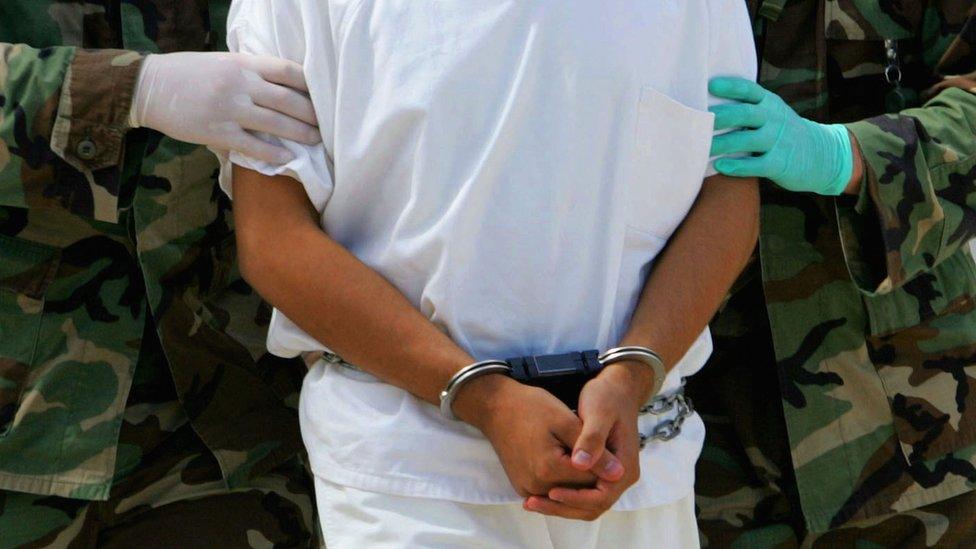
- Published9 December 2014
